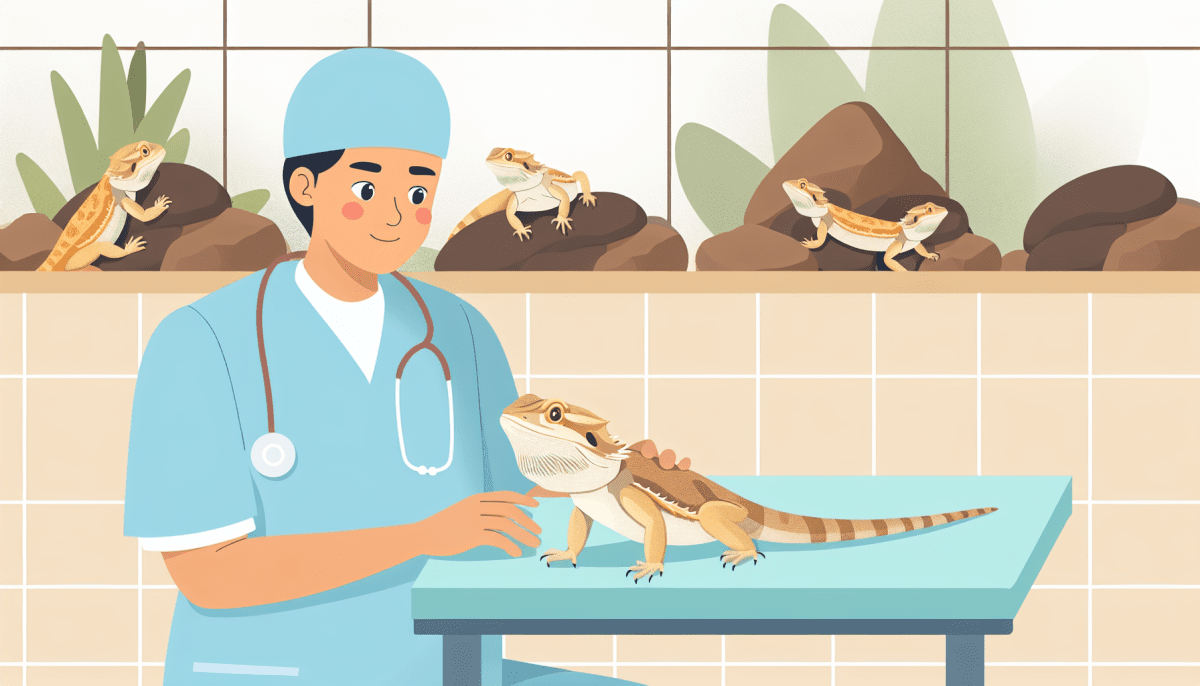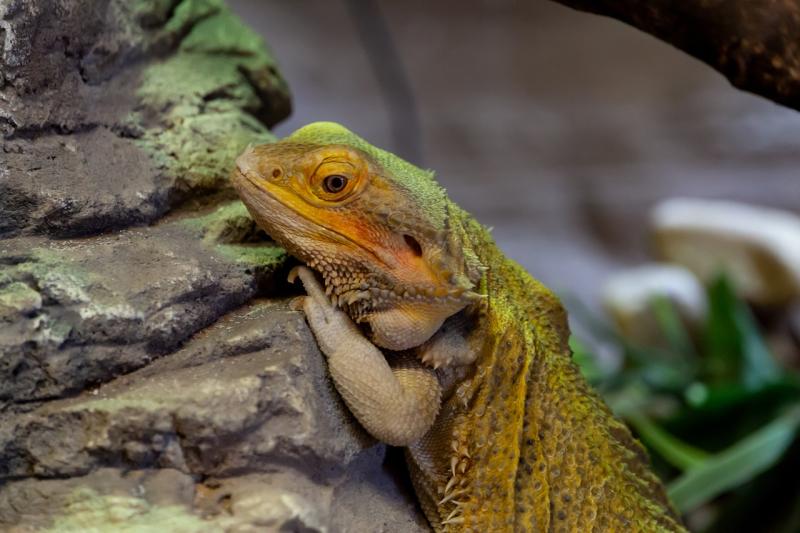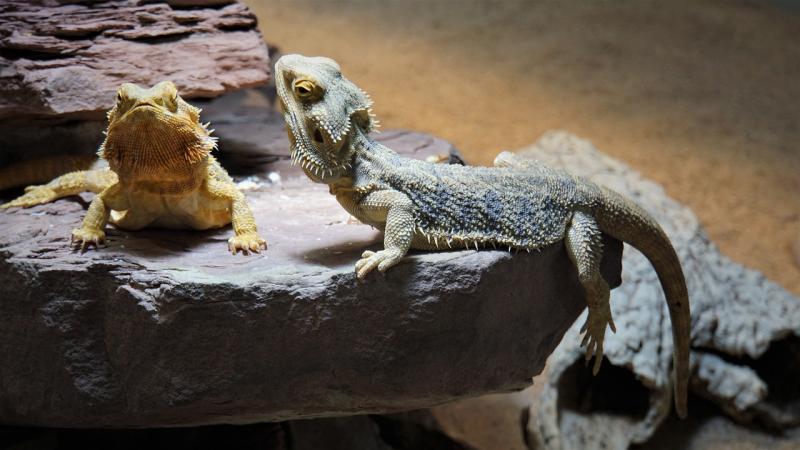When our beloved bearded dragons fall ill, it can be a source of great concern for us as their caregivers. However, before rushing to the vet, it is worth exploring some simple remedies that can help alleviate their common ailments. Here are a few natural solutions that can be found right in your own "pharmacy" for your bearded dragon.
1. Warm Compress
Just as a warm compress can soothe our aches and pains, it can also offer relief to ailing bearded dragons. If your dragon is experiencing digestive issues or constipation, a warm compress applied gently to their abdomen can stimulate bowel movement and help ease their discomfort. Remember to use a warm, damp cloth and not a hot one to avoid burning their delicate skin.
2. Honey and Chamomile Tea
Similar to how we turn to soothing teas for relief, a mixture of honey and chamomile tea can work wonders for bearded dragons as well. This remedy is particularly helpful for treating minor respiratory issues in bearded dragons. Simply brew a cup of chamomile tea, let it cool, and add a teaspoon of honey. Feed the cooled tea to your dragon using a syringe, ensuring they swallow it properly.
3. Bathing in Epsom Salt
If your bearded dragon is suffering from a mite infestation, a warm bath with Epsom salt can be quite effective in combating these pesky critters. Create a shallow bath by mixing warm water with a small amount of Epsom salt and gently place your dragon in it. Allow them to soak for about 20 minutes. The saltwater solution can help suffocate and kill mites, providing relief to your pet.
4. Aloe Vera Gel
Aloe vera gel is a fantastic natural remedy for several skin issues, including burns, irritations, and mild infections. The cooling properties of aloe vera can provide instant relief to your bearded dragon's discomfort. Simply apply a small amount of pure aloe vera gel to the affected area and let it dry. Make sure to use a reputable brand of aloe vera gel without added chemicals or fragrances.
5. Vitamin and Calcium Supplements
While not exactly remedies, ensuring your bearded dragon receives an adequate supply of vitamins and calcium is vital for their overall health and immune system. Lack of these essential nutrients can lead to various health complications. Consult with a reptile specialist to determine the appropriate supplements required for your dragon's specific needs.
Remember, although these remedies can be effective for treating minor ailments, it is crucial to seek professional veterinary advice for more serious or persistent health issues. Monitoring your bearded dragon's wellbeing and providing proper care and nutrition are the best ways to prevent illnesses. With a little understanding and some remedies in your "pharmacy," you can help ensure your scaly companion stays happy and healthy.
First Aid for Scales: Quick Fixes for Common Issues
Bearded dragons are popular reptile pets known for their playful nature and unique appearance. However, like any living creature, they can sometimes experience health issues. In this article, we'll explore some of the most common ailments bearded dragons may face and provide you with quick first aid solutions. Remember, these remedies are for minor issues and should not replace professional veterinary care.
1. Shedding Difficulties:
Bearded dragons periodically shed their outer skin layer. However, sometimes they may face difficulties in this process, leading to incomplete shedding or retained skin. If your dragon is struggling, you can assist them by creating a humid environment. Provide a moist hide or enclosure, where your pet can go to help soften the skin. Gently soaking them in lukewarm water can also help. Be careful not to peel their skin off forcefully, as this can cause injury.
2. Impacted Digestion:
Impaction occurs when your bearded dragon is unable to pass a stool due to blockage. This can happen if they accidentally ingest something indigestible or have insufficient fiber intake. To treat mild impaction, you can try gently massaging their stomach in a circular motion. Be sure to provide ample hydration through a shallow dish of water or a dropper. It's also a good idea to check their diet and ensure they are getting enough fiber-rich greens.
3. Minor Cuts or Wounds:
If your bearded dragon has a small cut or wound, clean it gently with a mild antiseptic or saline solution. You can apply a thin layer of petroleum jelly or an antibiotic ointment to keep the wound clean and facilitate healing. Ensure that the enclosure is clean and free of sharp objects to avoid re-injury. If the wound appears deep or isn't healing, it's essential to seek professional veterinary assistance.
4. Dehydration:
Inadequate hydration can lead to serious health issues in bearded dragons. If you suspect your pet is dehydrated, make sure they have access to fresh water at all times. In severe cases, you may try offering a rehydration solution made from mixing water with electrolyte powder or a few drops of unflavored Pedialyte. However, it's crucial to consult a veterinarian for proper evaluation and treatment if dehydration persists.
5. Respiratory Symptoms:
If your bearded dragon is displaying signs of a respiratory infection, such as wheezing, labored breathing, or mucus discharge, it's vital to seek veterinary care. However, in the meantime, you can improve their environmental conditions to make breathing easier. Ensure the enclosure has proper ventilation, maintain appropriate humidity levels, and keep the temperature within a suitable range. Avoid sudden temperature changes and remove any damp bedding.
Remember, while these first aid tips can help address minor issues, it's crucial to consult a reptile veterinarian for any persistent or severe symptoms. Regular check-ups and a well-maintained habitat can go a long way in preventing many common ailments in bearded dragons. Being attentive to their needs and providing a suitable environment will ensure your scaly companion stays healthy and happy!
Nurturing Your Bearded Dragon Back to Health
Bearded dragons are fascinating reptiles that make excellent pets. However, just like any other living creature, they can sometimes fall ill. As a responsible owner, it is essential to be aware of common ailments that can affect your bearded dragon and know how to care for them properly to help them regain their health.
1. Providing Optimal Enclosure Conditions
The first step in nursing your bearded dragon back to health is to create a suitable environment. A clean and well-maintained enclosure with appropriate temperature and lighting is crucial for their recovery. Ensure that the temperature gradient in the tank is correct, with a basking area that reaches around 100 degrees Fahrenheit and a cooler side that remains at 75-85 degrees.
Consider adjusting the lighting to provide a proper balance of UVB and UVA rays, as this helps promote their overall well-being. Bearded dragons require access to natural light, but if it is not possible, special reptile bulbs can serve as an alternative.
2. Ensuring a Balanced Diet
Feeding your bearded dragon a well-balanced diet is vital for their recovery. Generally, they require a mixture of vegetables, fruits, and insects. However, when they are unwell, their appetite may decrease significantly, making it necessary to adjust their diet accordingly.
If your bearded dragon is not eating, consider offering soft, easily digestible foods such as pureed vegetables or finely chopped fruits. In some cases, hand-feeding may be necessary to ensure they receive adequate nutrition. Consult with a reptile veterinarian for advice on specific dietary requirements and supplements to support their recovery.
3. Addressing Respiratory Issues
Respiratory infections are common in bearded dragons and can be quite serious. If you notice any signs like wheezing, nasal discharge, or open-mouthed breathing, it is crucial to seek veterinary care promptly. To provide temporary relief at home, create a warm and humid environment for your reptile by using a vaporizer or placing a humidifier nearby. This can help alleviate symptoms and keep their respiratory system moist.
4. Hydration and Bathing
Proper hydration is essential for the well-being of your bearded dragon, particularly when they are unwell. Encourage them to drink by providing a shallow dish of fresh water in their enclosure. Additionally, regular bathing can aid in hydration and help clear any impurities from their skin.
Prepare a warm, shallow bath and gently place your bearded dragon in it, allowing them to soak for about 15 minutes. Ensure the water temperature is comfortable, around 85-90 degrees Fahrenheit. This not only helps them rehydrate but can also be a relaxing experience for them.
5. Minimizing Stress and Handling
When your bearded dragon is unwell, it is essential to minimize stress as much as possible. Avoid handling them excessively and create a calm and quiet environment. This gives them the opportunity to rest and focus on recovering.
If you need to move them, ensure to do so gently and use supportive hands to minimize any discomfort. Always remember to wash your hands thoroughly before and after handling to prevent the spread of any potential infections.
In conclusion, providing the best care for your bearded dragon when they are unwell involves creating a suitable environment, adjusting their diet, addressing respiratory issues, promoting hydration, and minimizing stress. However, it is important to keep in mind that these are general guidelines, and for specific ailments or severe conditions, consulting a reptile veterinarian is crucial to ensure proper treatment.



